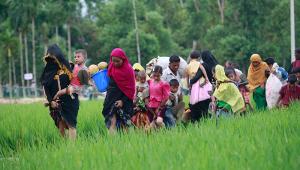DfID secretary Penny Mordaunt warned, as she announced the package on 31 December, that 2018 could be “even bleaker” than last year, particularly with ongoing famines and conflicts in Yemen, South Sudan and Burma.
She said: “[In 2017], through UK aid and further public donations, we helped avert famines in Nigeria and Somalia, gave emergency help to the survivors of the Caribbean hurricanes and provided a vital life-line to people suffering from conflict in Syria and Yemen.”
The aid package will go to the United Nations’ Central Emergency Response Fund (CERF) to enable agencies to respond quicker to under-funded emergencies in 2018.
It will help provide critical health services to 20 million people, clean water and sanitation to 13 million people as well as food to 9 million people, DfID said in a statement.
The aid is in addition to the core funding allocation of £55m in CERF in 2017.
DfID also announced a £77m aid package to Syrian refugees living in Lebanon from its humanitarian budget for the Syrian crisis.
In November last year, shortly after being appointed, Mordaunt said DfID should justify its spending in the same way charities do to gain public confidence.













